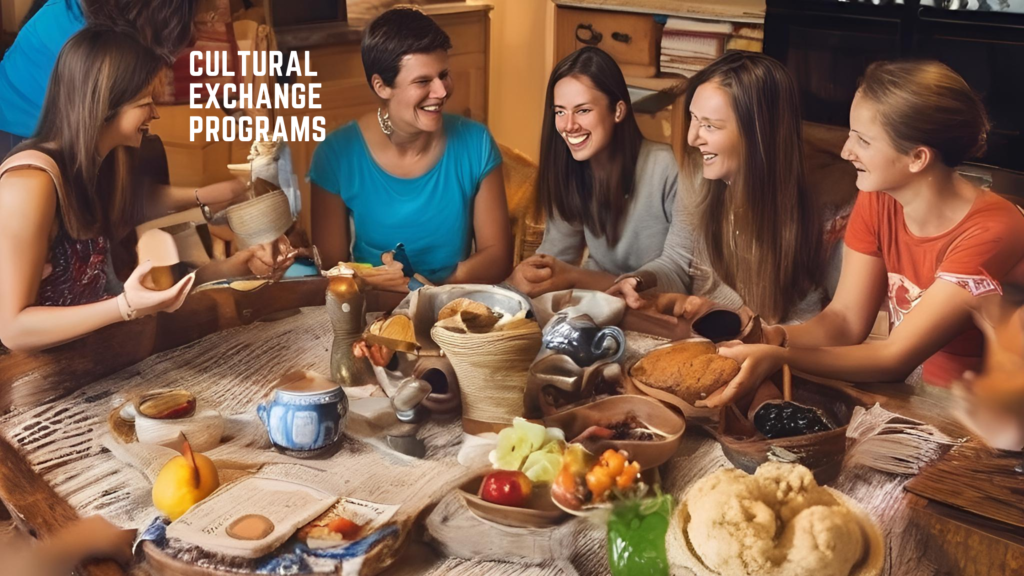in Homestays or Exchange Programs
Introduction to Cultural Exchange Programs
Cultural exchange programs serve as a gateway to the heart of new cultures, providing participants with unique opportunities that traditional travel cannot offer. While conventional travel often focuses on seeing renowned landmarks and ticking items off a bucket list, cultural exchanges immerse individuals in the essence of daily life. They offer experiences that deepen understanding, showcase local traditions, and foster connections that enrich both participants and their hosts. Through these experiences, travelers step into the shoes of locals, gaining a profound appreciation for the rich tapestry of human traditions, perspectives, and values.
The Concept of Homestays
At the core of many cultural exchange programs are homestays, which provide participants with the invaluable opportunity to live with a local family. Unlike hotels or hostels, homestays encourage interaction, shared meals, and participation in daily routines. This setting allows for personal connections between guests and hosts, often leading to friendships that transcend cultural boundaries.
Host families act as cultural ambassadors, providing insights into customs, traditions, and the local way of life. Through shared experiences like preparing meals, observing daily rituals, and participating in family gatherings, travelers gain intimate knowledge of the culture, fostering a mutual exchange of knowledge that benefits both the guest and the host family.
Types of Cultural Exchange Programs
Cultural exchange programs come in various forms, catering to diverse interests and goals. Here are some common types:
- Academic Exchange Programs: These programs typically involve studying abroad at a partner institution, allowing participants to gain international perspectives while furthering their education. Students attend classes, engage with local peers, and experience academic traditions firsthand.
- Volunteer-Based Exchanges: These programs focus on community service, where participants contribute to local projects. Types of volunteer work may include teaching, conservation efforts, healthcare assistance, or other community development initiatives.
- Professional Exchanges: This category allows individuals to gain industry-specific experience abroad. These exchanges can lead to career advancement opportunities and foster cultural competence within professional settings.
The Benefits of Living with a Local Family
Living with a local family provides unparalleled opportunities for authentic cultural immersion. Daily interactions reveal subtle yet profound aspects of a culture—such as how families celebrate holidays, resolve conflicts, and maintain traditions. This embedding in daily life not only accelerates language learning but also enriches the participant’s understanding of social dynamics.
Interaction with native speakers fosters effective language acquisition as participants are surrounded by everyday conversation and contextual learning. This environment often leads to a more nuanced understanding of colloquialisms and regional dialects that one might not encounter in a formal classroom setting.
Moreover, relationships formed during homestays can evolve into lifelong friendships, providing a sense of belonging that crosses geographical and cultural boundaries. These bonds often create networks of support and understanding that participants can draw upon long after the exchange has ended.
Popular Destinations for Cultural Exchanges
Certain countries shine when it comes to vibrant cultural exchange programs. Here are a few notable examples:
- Japan: Homestay programs in Japan often introduce participants to the intricacies of traditional tea ceremonies, local festivals, and the significance of Shinto shrines and Buddhist temples.
- Spain: Exchange students in Spain may immerse themselves in the rich tapestry of Flamenco dancing, tapas dining, and local fiestas, learning about the communal spirit inherent in Spanish culture.
- Ghana: Participants in Ghana can expect a rich cultural heritage experience involving music, storytelling, and communal living, providing an insightful look into African traditions, values, and community life.
Each destination promises unique insights, colorful experiences, and memories that linger long after the journey concludes.
How Cultural Exchange Programs Promote Global
Citizenship
Cultural exchange programs are not merely travel opportunities; they are vital pathways to global citizenship. By living and learning alongside people from diverse backgrounds, participants develop empathy and a broader worldview. Cultural exchanges challenge stereotypes and foster understanding, encouraging individuals to embrace differences rather than fear them.
These enriching experiences often inspire participants to act as advocates for inclusivity and cross-cultural collaboration in their own communities, embracing the lessons learned during their exchanges. Ultimately, participants return to their home countries with a renewed sense of responsibility towards global citizenship and a commitment to fostering understanding.
Preparing for a Cultural Exchange Experience
Preparation is crucial for maximizing the potential of a cultural exchange program. Here are several important steps to consider:
- Research: Conduct thorough research on the host country’s history, customs, and cultural practices. Understanding local norms helps set realistic expectations, making participants more adaptable and respectful.
- Packing: Carefully packing appropriate clothing and essentials that align with cultural expectations is necessary. Consider the climate and cultural norms, and always include a few small gifts to present to the host family as a gesture of goodwill.
- Mental Preparation: To ease the transition into a new environment, it’s essential to remain open-minded and adaptable. Cultivating a willingness to learn and embrace the differences is key to ensuring a smooth and fulfilling cultural exchange experience.
Adapting to a New Environment
Adjusting to a different culture can present both challenges and rewards. Culture shock—a common experience marked by feelings of disorientation or homesickness—can be part of the adjustment process. Overcoming these challenges requires patience, curiosity, and a willingness to step out of one’s comfort zone.
Participants can ease their transition by engaging in family traditions, trying unfamiliar foods, or participating in local customs, which helps to build rapport with their host family. It’s beneficial to ask questions about local practices, allowing host families to share their culture in a way that makes guests feel welcome. Additionally, adopting a positive mindset and maintaining flexibility aids in navigating potential misunderstandings or awkward situations that might arise.
Challenges of Cultural Exchange Programs
While cultural exchange programs offer incredible opportunities, they are not without their hurdles. Here are some common challenges faced by participants:
- Language Barriers: Language differences can lead to misunderstandings, creating frustration for both guests and hosts. However, these situations also provide valuable learning experiences. Participants often develop creative communication methods, using gestures, visual aids, or translation apps to bridge language gaps.
- Homesickness: Feeling homesick is natural, especially when placed in an unfamiliar environment. Staying connected to loved ones through phone calls or video chats can provide emotional support while building meaningful relationships within the host community helps to fill the void.
- Different Cultural Norms: Cultural practices may vary significantly from those participants are accustomed to, which can lead to misunderstandings or discomfort. Remaining respectful and open-minded, while learning and adapting, mitigates these tensions.
Success Stories from Participants
Success stories abound from individuals who have undergone transformative experiences through cultural exchanges. One inspiring account is that of a university student who traveled to Brazil for a summer program. Immersed in the local community, she discovered a passion for international relations and social justice after engaging with grassroots organizations.
Another example is a volunteer in rural India who, through her work helping local children access education, found a renewed sense of purpose and commitment to advocacy for underprivileged communities. Such stories highlight the profound and often unexpected ways cultural exchange programs can reshape lives, fostering growth and awareness in the participants.
Cultural Etiquette and Respect
Respecting cultural norms is essential for a successful exchange experience. Understanding and adhering to local etiquette showcases a participant’s genuine interest and humility towards the host culture. This includes learning about appropriate greetings, dining customs, and behavior in various social settings.
For instance, in Japan, it is customary to remove shoes before entering a home, while in parts of Africa, using the right hand for greetings is often viewed as a sign of respect. Learning common phrases in the local language, such as how to say “thank you” or “hello,” fosters goodwill and encourages positive interactions with the host family and community.
Language Learning Through Immersion
Immersive settings are optimal for language acquisition. Participants naturally pick up vocabulary and phrases through everyday conversations, often gaining insights into slang and idiomatic expressions that formal education typically overlooks. Engaging with children or elderly family members can prove particularly beneficial, as their speech tends to be slower and more deliberate, ideal for newcomers to practice listening and speaking.
The Role of Food in Cultural Exchange
Food is a universal language that has the power to connect people across cultures. Sharing meals with a host family offers a glimpse into local culinary traditions, providing context beyond the dish itself. From the preparation process to the significance of certain recipes, food becomes a lens through which culture can be explored.
Cooking meals together can also serve as a bonding activity, creating an opportunity for sharing stories and learning culinary techniques. Trying unfamiliar flavors broadens one’s palate and deepens appreciation for the culinary arts. As participants partake in local dining customs, they not only savor delicious meals but also gain insights into the cultural significance behind them.
The Environmental Impact of Cultural Exchanges
Cultural exchange programs can promote sustainable travel practices by encouraging participants to live like locals. Staying in homestays typically reduces the carbon footprint compared to opting for large, impersonal hotels and resorts. By choosing local accommodations, travelers directly contribute to the economy, supporting small businesses, markets, and artisans, which can revitalize communities more effectively than large tourism investments.
Additionally, engaging in local volunteer projects commonly associated with cultural exchanges helps foster environmental stewardship, encouraging participants to advocate for sustainability in their own communities upon returning home.
Technology’s Role in Modern Cultural Exchanges
Technology has revolutionized the cultural exchange experience, making participation more accessible and connected than ever. Potential participants can utilize platforms to research and connect with host families prior to arrival, using video calls to ease pre-trip anxieties.
Apps and online translation tools help bridge language gaps, enabling smoother communication between guests and hosts. Social media creates opportunities for long-term connections with host families and friends met during the exchange, allowing individuals to share updates, photos, and continued cultural learning.
Financial Considerations for Cultural
Exchange Programs
Financial planning is a crucial aspect of participating in cultural exchange programs. Budgeting effectively can make a significant difference in maximizing the experience while ensuring that costs are manageable. Here are some points to consider:
- Program Costs: While some cultural exchange programs are fully funded by educational institutions, nonprofits, or government initiatives, others may require participants to cover certain expenses. These can include airfare, program fees, accommodation, meals, and daily living expenses. Be sure to read the fine print of any program you’re considering to understand what costs you might incur.
- Scholarships and Grants: Many organizations offer scholarships and grants specifically for cultural exchange programs—especially for students and volunteers. Research options available to you and apply early, as funding can be competitive. These financial aids can help offset costs, making participation more feasible.
- Local Currency Management: When abroad, familiarize yourself with the local currency and the best practices for managing your finances. Consider using a combination of cash and travel-friendly credit or debit cards. It’s a good idea to have small denominations on hand for daily expenses and tips.
- Budgeting for Daily Expenses: Upon arrival, set a daily budget for meals, transportation, and activities. Being mindful of your spending can ensure that you have funds for any unexpected expenses that may arise during your stay.
The Lasting Impact of Cultural Exchange Programs
The effects of cultural exchanges extend far beyond the duration of the program. Participants often return home with a renewed sense of purpose and a broader perspective on global issues. The lessons learned and relationships formed during exchanges frequently inspire individuals to be more engaged in their communities and to advocate for inclusivity.
Many participants become passionate about sharing their experiences, encouraging friends and family to consider similar journeys. Group discussions, presentations in schools, or even blogging about their experiences allow travelers to spread awareness of cultural appreciation and understanding.
Moreover, it’s not uncommon for participants to pursue academic or career paths influenced by their cultural exchange experiences. Some individuals may seek roles in international relations, education, environmental advocacy, or humanitarian work—fields in which they can apply the insights and skills gained during their exchanges.
Tips for Choosing the Right Cultural
Exchange Program
Choosing the right cultural exchange program requires thoughtful consideration. Here are tips to guide you in making an informed decision:
- Identify Your Interests: Start by assessing what you hope to achieve from the program. Are you looking for language immersion, volunteer opportunities, or academic studies? Identifying your goals can help narrow down suitable options.
- Location Considerations: Think about the geographic region that interests you most. Consider factors such as climate, cultural environment, safety, and language. Researching specific countries or cities can help you find programs that align with your preferences.
- Program Duration and Structure: Evaluate how long you can participate and what kind of structure you prefer. Some programs may offer short-term exchanges, while others may require a more extended commitment. Analyze how each program adapts to your schedule and goals.
- Reviews and Recommendations: Look for reviews or testimonials from past participants. Websites, forums, and social media can provide valuable insights into the participants’ experiences. Speaking with alumni of the program can also give you firsthand information on what to expect.
- Verify Credibility: Research the organization offering the program. Check their history, mission, and accreditation status. Ensure that they prioritize participant safety and welfare, providing adequate support during your stay.
How to Stay Connected After the Program Ends
The end of a cultural exchange does not signify the end of meaningful connections. Here are ways to maintain relationships with host families and fellow participants:
- Regular Communication: Maintaining communication is vital to nurturing relationships formed during your cultural exchange. Reach out to host families through letters, emails, or video calls to strengthen bonds. Share updates about your life and ask about theirs, showing genuine interest in their ongoing experiences.
- Social Media Connections: Social media platforms provide an easy way to stay connected with host families and friends met during the exchange. Sharing photos, stories, and messages can keep the connection alive and encourage the sharing of each other’s lives.
- Join Alumni Networks: Many cultural exchange programs have alumni associations or networks where former participants can connect, share experiences, and engage in events. Joining these groups fosters continued cultural exploration and collaboration among diverse individuals.
- Attend Cultural Events: If possible, attend cultural festivals or events related to the host culture in your hometown. Engaging with local cultural communities will help you stay connected to the culture you experienced and foster connections with individuals who have shared similar experiences.
Conclusion: Embrace the World Through Cultural Exchange
Cultural exchange programs are transformative journeys that open doors to understanding, empathy, and lifelong memories. By stepping out of one’s comfort zone and into the lives of others, participants gain not only cultural insights but also a deeper appreciation for the shared humanity that unites us all. These experiences challenge preconceived notions, break down barriers, and ultimately foster a more peaceful and interconnected world.
Embrace the world through culture exchange programs and discover the depths of human connection that await you. Each journey into another culture presents an opportunity to learn, grow, and contribute to a larger narrative of global understanding. Whether you’re sharing meals around a local table, participating in local customs, or engaging in meaningful conversations with your host family, you are not just a traveler—you are an ambassador for your own culture and a learner of another.
In this increasingly interconnected world, the importance of empathy, respect, and cultural appreciation cannot be overstated. By participating in cultural exchange programs, you actively contribute to a more inclusive and harmonious global community. The friendships you forge, the traditions you embrace, and the lessons you learn will shape your worldview and inspire you to advocate for cultural diversity and understanding long after your journey has ended.
So, embark on this life-changing adventure. Open your heart and mind to the beauty of cultural differences, and prepare to be enriched in ways you never imagined. The world is brimming with stories, lessons, and connections just waiting to be discovered through the lens of cultural exchange. Whether you choose to live with a local family, volunteer in a community, or study abroad, you will return home with a treasure trove of memories and insights, forever transformed by your experiences. Embrace this opportunity, and let the world’s cultures inspire you to live more deeply and authentically.



